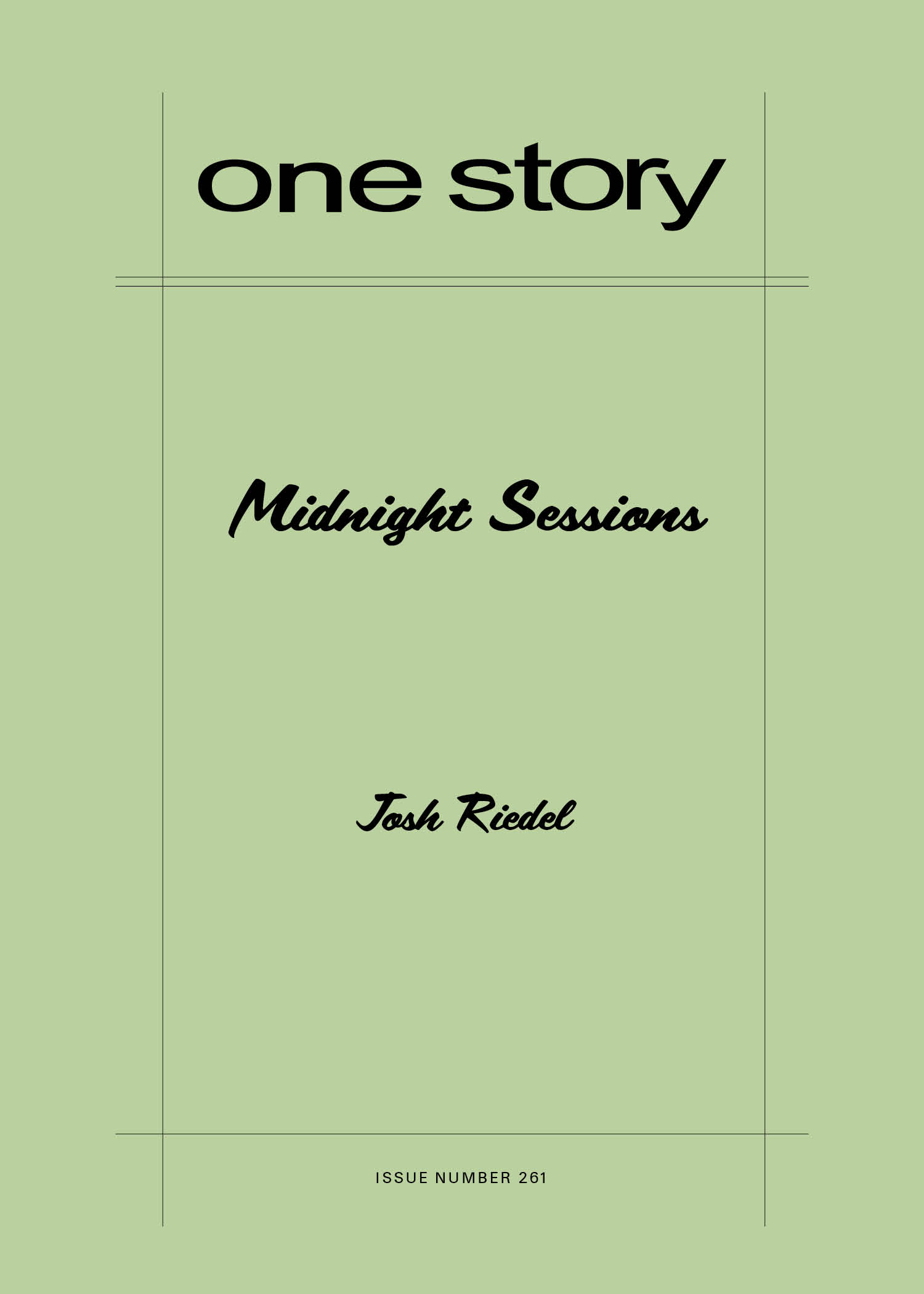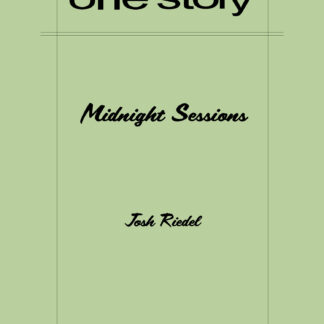
Midnight Sessions
$2.50
179 in stock
Excerpt
Late for work, Moot Mangorski raced across the Cleo Corp campus to the Research and Development Building, where that morning a crowd of protestors had gathered in the lobby. What was it this time? A man bared his fuzzy teeth. A woman waved a poster of a moldy tooth. Two children squeezed out sparkling coils of green toothpaste onto the marble floor. Ah yes, Forest Fresh. Rumor was, the toothpaste encouraged the growth of a peculiar mold. Probably true, but what had they expected? The company’s hygiene products always caused certain cosmetic alterations, usually minor. Why else would they sell them so cheap? Besides, wasn’t it too late to worry about all this? Hadn’t earlier generations already poisoned the earth? How did anyone find the energy to protest toothpaste, of all things?
Still, Moot liked to acknowledge the protestors. “Good morning,” he said to a rangy man with aqua hair. The protestor blocked his path. “Excuse me,” Moot said, pushing his way to the elevator. Stars swirled in Moot’s skin, clustering at his fingertips. He shoved his hands into his pockets.
“Wait,” the protestor said, watching a star travel up Moot’s neck. “Are you—” He reached for the ID badge clipped to Moot’s shirt pocket. Moot turned away and stabbed the button for the elevator. “You are!” the man exclaimed. “You actually work here, after what they did to you?” The elevator doors opened, and Moot rushed in. “Wait!” the man cried. Moot mashed the buttons until the doors sealed shut.
Josh Riedel
Josh Riedel worked at startups in Silicon Valley before earning an MFA from the University of Arizona. His fiction has appeared or is forthcoming in Passages North and Sycamore Review. The recipient of fellowships from Yaddo and the Field Studies in Writing Program on Grand Manan, he has recently completed a novel and is at work on a collection of short stories about technology, work, and the environment. He lives in Portland, Oregon. More at joshriedel.com and on Instagram @josh.
Will Allison on “Midnight Sessions”
I was aware that Josh Riedel had worked at Silicon Valley startups in a former life, so I wasn’t surprised to find that “Midnight Sessions” dishes up a zesty critique of corporate technology run amok. I was, however, surprised and wholly captivated by the fantastical world that blooms within the story’s pages.
Set in the not-too-distant future, “Midnight Sessions” takes place on the vast campus of a mega-corporation called Cleo Corp, which produces, among other things, cheap cosmetics known to cause strange side effects, such as the stars that sparkle and swirl beneath Moot Mangorski’s skin after he uses—and becomes addicted to—Midnight Sessions cologne. But when Moot sues, the company’s crafty CEO, Mr. Sackamoray, convinces Moot to come work for Cleo Corp, where his perks include a free condo and a lifetime supply of the now-banned cologne.
Moot’s job is to “cure” others who suffer side effects from Cleo Corp products. These “subjects” are paid to spend three nights in a suite on campus, where sophisticated instruments collect samples from their bodies and analyze them to find a cure. (Of course the samples are secretly used for R&D purposes.) Moot has mixed feelings about his job, and he feels even more conflicted after meeting Flux, a subject whose use of Forest Fresh—a budget toothpaste—causes his teeth to sprout green, moldy fuzz. As Flux’s side effects intensify, a complicated relationship develops between the two men, and it becomes unclear if Moot will succeed in saving Flux, or vice versa.
I won’t give away more of the plot, but it’s a wild ride, and I promise the final scene is one you won’t soon forget. We’re very excited to be presenting Josh’s work here at the start of his career, and we hope you find “Midnight Sessions” to be as much a feast for the imagination as we did.
Q&A by Will Allison
- WA: Where did the idea for this story come from?
- JR: I was coming out of a job where I worked on a corporate campus, and I was thinking a lot about the ways in which we—as employees, as consumers, as citizens—interact with public corporations. The opening—Moot running into Flux in the lobby and then meeting Mr. Sackamoray on the rooftop—was the seed of the story. It’s remained almost entirely intact from the first draft.
- WA: What was the most challenging aspect of writing this story?
- JR: Patience. I wrote the first draft in early 2015, a first-person narrative that involved an “eBay for scents.” I put the story away, revised and workshopped it in grad school a couple of years later, then put it away again, still not sure where it was going. Along the way, a few readers were really encouraging and could see the story’s potential before I could. Their voices stayed with me, and a few months after I finished grad school, I decided to take a break from my novel to revise “Midnight Sessions.” I revised for a week in March, a week in April, and a couple of weeks in May 2019 before submitting the story. In all of these revisions, it wasn’t that there was a single element of the story I couldn’t get right; it was more holistic. I wanted the story to feel expansive.
- WA: Once, when Patrick and I were discussing this story, he said, “I love how much it gives the reader to do, to picture, to imagine.” I feel the same way. Can you talk about the role of fantasy in your writing?
- JR: I’ve always liked to read mythology and folklore. In fact, at one point I thought of this story as part of a collection of mythologies about late capitalism. That said, I don’t set out, when I write a story, to include fantastic elements. They arise organically, usually as a result of my reading. I’d just read Mrs. Caliban around the time I was finishing the final draft of “Midnight Sessions,” and even though I wasn’t actively thinking about the book when I was writing the story, I can see, in hindsight, Ingalls’s influence. Italo Calvino’s “The Daughters of the Moon” is a favorite short story of mine, and I kept it open in a browser window as I worked on revisions. Kelly Link has been a big influence on my work in general, as have Karen Russell and Haruki Murakami.
- WA: “Midnight Sessions” takes place on the campus of Cleo Corp, a mega-corporation whose technology seems to touch every aspect of American culture. Is this a thematic concern that grew out of your prior career in tech startups?
- JR: That’s probably accurate. I wrote the first draft of this story the year after I left my job at Instagram, where I was hired as the first employee the same month the app launched to the public. So I got to see firsthand how a small app can become a cultural phenomenon. See and participate in, I should say. When Instagram was acquired by Facebook, we left our small startup office for Facebook’s corporate campus, where I learned a lot about how Facebook exerts its enormous influence on our culture. Since then, I’ve taken a special interest in how a variety of corporations affect our way of life: our culture, politics, health, environment, etc. Despite my reservations about certain aspects of the tech industry, I do credit my time working and living in Silicon Valley with pushing my fiction into a more speculative realm. I was surrounded by brilliant engineers and designers and researchers constantly thinking about the future and then trying to create those imagined futures, for better or worse. As a fiction writer, it was exciting and energizing to contemplate those pending realities.
- WA: The story’s climax scene reminded me of, among other things, Where the Wild Things Are, which I loved as a child. When you wrote that scene, did you have a particular visual inspiration in mind?
- JR: Thank you for saying that. I love that book too. I wrote the climax scene last year when I was living north of San Francisco, near the Point Reyes National Seashore. I spent a lot of time hiking and running on trails around there, following creeks through the forest to the ocean. Most days I’d see more foxes than people, though sometimes I’d wander into Point Reyes Books for inspiration. It’s a magical store, with a big display wall of children’s books in the back, so it’s entirely possible I’d seen a copy of Where the Wild Things Are on a visit. I mean, I have no idea, but I like to think that stories I’ve read or heard, even ones I haven’t thought about in a long time, find ways to resurface in my fiction.
- WA: As long as we’re on the ending: the story’s final line takes a sort of allegorical leap that I found both surprising and delightful. Were you always working toward that ending, or did you discover it along the way?
- JR: My biggest fear in sending this story out was that someone would ask me to cut that final line, so I’m so glad you like it. I discovered it along the way, fairly late in the revision process. I began thinking of the story as a kind of creation myth that someone around a campfire in the distant future would tell, and the line came from that. Later, when a friend read the draft, he told me the final line reminded him of a line in a story I’d written in college, over a decade ago. I’d completely forgotten the story, but I looked later, and he was right!
- WA: How long did it take you to complete this story?
- JR: Over four years. I recently moved back to Portland and while unpacking came across an old whiteboard. The top of the whiteboard reads “April 2015,” and below that, “MS Draft,” with a checkmark next to it. I don’t think I realized then how far the story was from being finished.
- WA: Congratulations on recently finishing a novel. How would you compare writing it to writing short stories?
- JR: I am a very mediocre surfer, and sometimes when I’m surfing, I can get “caught inside,” where the waves break. When this happens, you might have to let a wave crash on you before you can paddle farther out, past the whitewater. But sometimes you get caught inside when a big set comes through, and you have to let multiple waves crash on you. When this happens, you have to stay calm and keep your breathing steady, even when all you can see on the horizon are more waves. That’s how writing a novel felt.
- WA: What are you working on now?
- JR: A set of linked narratives that explores the Cleo Corp campus from the perspectives of other resident-employees.
- WA: What is the best bit of advice about writing you have ever received?
- JR: Be patient. So many writers I admire have told me this in different ways over the years, and although I certainly have not always followed the advice, I am most satisfied when I slow down.
